|
|
Expedition
Expedition | People
|
Log - August-14-2003
by Gerhard Behrens
Previous | Next
So, you wanna be a scientist?
Gerhard Behrens |
| At my school, Adams Elementary in Corvallis, OR, every student knows about Lifeskills. It’s a list of 15 ways to act if you want to be an all-around good person. At the beginning of this trip, I wondered how these skills fit into the life of a scientist and into life on a science mission like CATS. Now that we’re at the end, the problem is keeping the description of the Lifeskills on this trip short enough for you to read. Hang in there! |
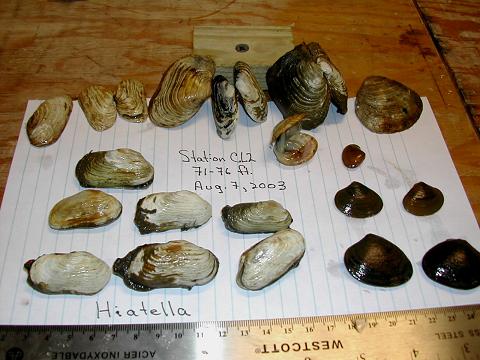
Curiosity: Can clamshell rings help us learn about water and weather patterns? |
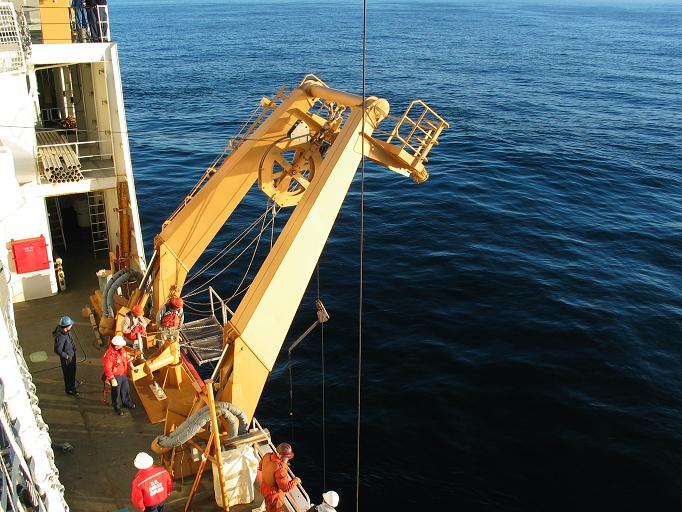
Cooperation: The Healy’s cranes, USCG Marine Science Techs, and a coring team work together. |
Curiosity means you are excited to learn new things. This might be the most important Lifeskill because it brought all the scientists here. What’s going on with the currents in Arctic waters? Could clamshell rings tell us about water and weather patterns? Right behind curiosity is Initiative, starting something on your own. Full of questions, these scientists had to do something about it. They had to write a plan, ask for permissions, and get money, proving that their questions are worth studying. |
| Cooperation means working with others as a leader or follower. Without it, this whole project is doomed. Scientists from around the United States and Canada are putting their expert minds together. The Coast Guard crew makes every sample and every test possible with this big ship, helo flights, small boats, divers, lab space, cranes, computers, bathrooms, bedrooms, and a chow line! |
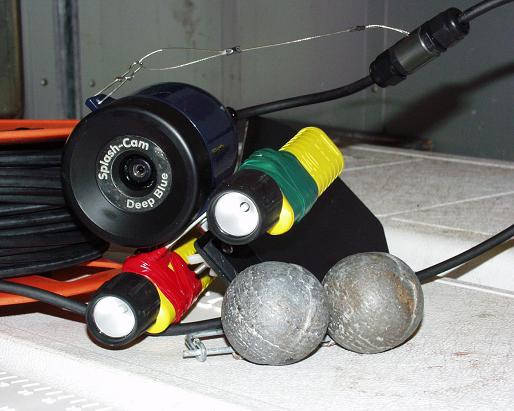
Problem Solving: How do you see underwater? Use a camera, weights, flashlights, tape, and a rudder. |
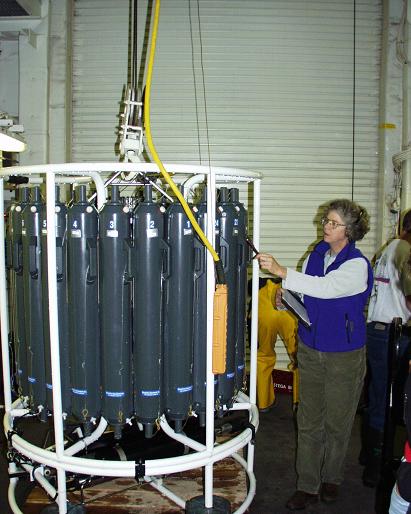
Organization and Common Sense: Chi is the sample cop, keeping hundreds of water samples straight. |
When you use all your knowledge to figure out a solution, you are Problem Solving. That happens every day around here. When mooring cables were left out of a shipment, we had to get some. When a CTD monitor stopped working, it had to be fixed. Next to problem solving skills is Common Sense, figuring out what to do without a specific rule; just using good judgment. With 13 different water tests going on, how do you keep track? Kelly and Chi came up with “the sample cop,” one person who makes sure water gets to the right person and test results come back to one place. |
| Any person or any project has to be Organized: having a plan and following through; having things in their place. Kelly Falkner, the chief scientist has to schedule each “station” where we get samples, put in a mooring, gather clams, or map the sea bottom. Tons of tools and equipment have to be brought and put in the right place. Read the packing list from August 12 if you need a reminder about the organization involved in this trip! |
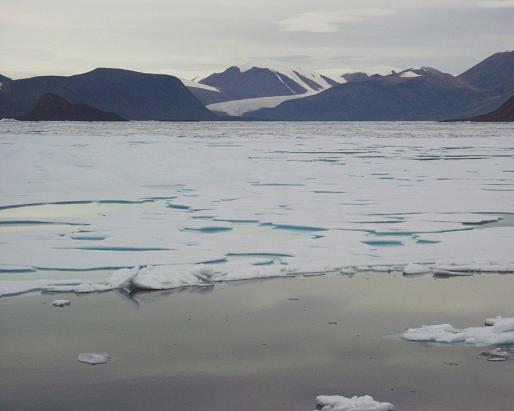
Flexibility and Patience: Too much ice; no science today. Two weeks later, it was clear. |
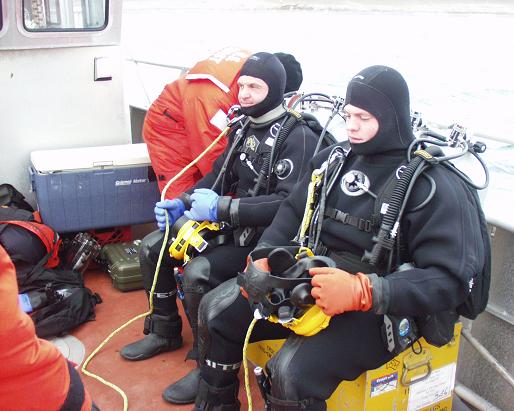
Effort: The divers head into COLD water, over and over and over. |
But, for everything that is organized and planned, a scientist has to be Flexible: able to handle change and go with the unexpected. Yesterday, 50-knot winds blew and a mooring operation had to be cancelled. Sunday, the sea bottom was too hard, and then too soft, to place a mooring. At the third choice, we found the bottom to be “just right.” Patience means you are able to wait. Two weeks ago, we came to Alexandra Fiord to place a mooring and get clams. We found too much ice. We are back, two weeks later, in a clear fiord with good weather. Robie Macdonald says, “You can’t rush research in the Arctic". |
| The next set of skills is very personal. You do these especially when no one is looking. Effort means you do your personal best. Every person on this ship is here because they proved this at their jobs. Perseverance means you keep trying, even when something is hard. The rosette crew had a few 24-hour shifts: collecting water samples all day and all night. The mooring crew had to build 26 units, one after the other, day in and day out. Responsibility means doing what you are supposed to do, and involves trust. One person can ruin the bathrooms on the whole ship by throwing something down the toilet. If a person on “watch” does not check the computers, the sea bottom mapping can be lost. Integrity means you do what’s right, and usually involves courage and truthfulness. A scientist has to report what they find, not what they wanted to find. A valuable coring operation had to be cancelled because the weather made it unsafe to work with 500 kilos (1200 pounds) of weight. |
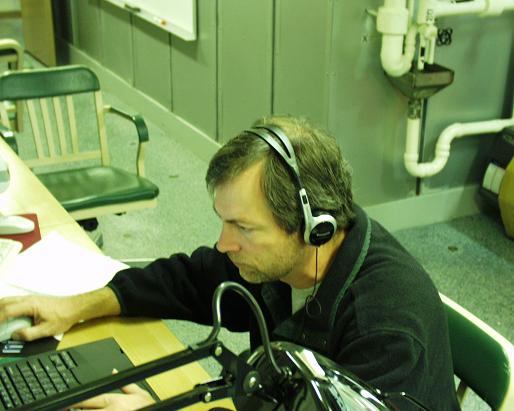
Perseverance: Roger Davis works seafloor mapping computers for long hours. |
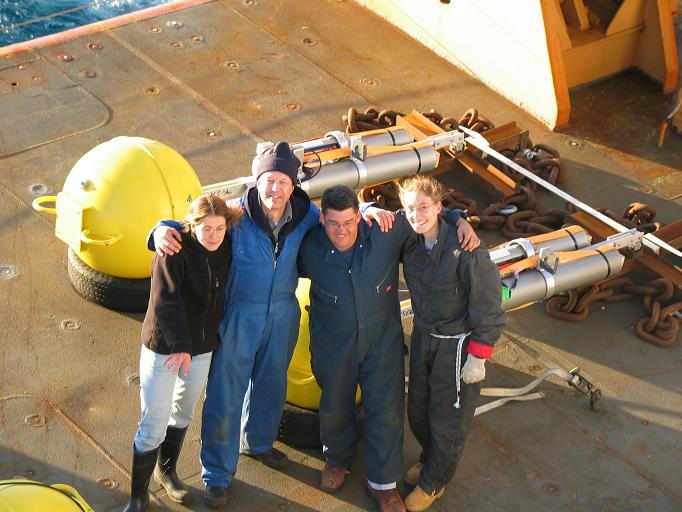
Laughing, Caring, Appreciation: The mooring team celebrates a job well done. |
Finally, there are some Lifeskills that make living joyful. We all need this. Caring is the golden rule: treat others like you want to be treated. Be a good listener and pass on compliments. The chief scientist awarded golden globes (chocolate wrapped in gold paper) to teams as their work progressed. She even cleaned a few toilets in the lab. We listened to successes and failures during team meetings. We shared stories at mealtimes. A Sense of Humor lets you have fun, without hurting others. Every day, Ed Hudson shared silly things he heard around the ship. Poems were written about the scientists. We made each other laugh during long work sessions with jokes and stories. Appreciation means you are thankful. We used “Thank You” a lot during the past month, and we meant it! |
| There you have it. It takes a lifetime to master these skills. They will help you be a good mechanic, plumber, teacher, doctor, programmer, chef, teammate, mom, dad, and, of course...scientist. |
| The Lifeskills are part of Susan Kovalik’s Integrated Thematic Instruction. |
|
